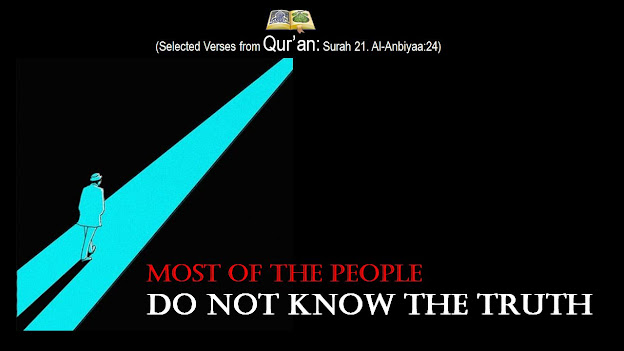Even today, there are lot of people or most of the people, who without reading Qur'an or understanding the religion of Islam, hate Islam merely by hearing it from others. And even if someone tries to talk to them on Islam, they turn their face and go away. But the interesting thing is that many who tried to know what Qur'an and Islam is, fall in love with Islam and come under its fold. There have been many instances and revert experiences wherein people confess that they read the Qur'an to find faults with it, but instead finding it the best medium to know the truth that their religion of faith failed to help them do so.
It is in this context that we share the 24th verse of Surah 21. Al-Anbiyaa:
اَمِ اتَّخَذُوۡا مِنۡ دُوۡنِهٖۤ اٰلِهَةً ؕ قُلۡ هَاتُوۡا بُرۡهَانَكُمۡ ۚ هٰذَا ذِكۡرُ مَنۡ مَّعِىَ وَذِكۡرُ مَنۡ قَبۡلِىۡ ؕ بَلۡ اَكۡثَرُهُمۡ لَا يَعۡلَمُوۡنَ ۙ الۡحَـقَّ فَهُمۡ مُّعۡرِضُوۡنَ
(21:24) Have they taken gods other than Him? Say, (O Muhammad): "Bring forth your proof! Here is the Book with admonition for those of my time and there are also scriptures with admonition for people before me." But most people do not know the Truth, and have, therefore, turned away from it.
The first two were rational arguments and this is a historical one. This means that the study of all the former Scriptures shows that the Creator of the universe is One Allah and He alone is worthy of service and worship, while "Your religion is neither supported by rational arguments nor by historical evidence."
It is their lack of knowledge of Reality which has created this indifference towards the Message of the Prophet, and the same has made them heedless of the Message.
Muhammad Asad Explanation:
That is most people's obstinate refusal to consider a reasonable proposition on its merits is often due to no more than the simple fact that it is not familiar to them.
Yusuf Ali Explanation:
In this verse, we are warned against a third danger, the worship of false gods of any sort. Pagan man is prolific of creating abstract images for worship, including Self or abstract Intelligence or Power. In verse 26 below is mentioned a fourth kind of false worship, which imagines that Allah begets sons or daughters.
This verse should be read with the next ((21:25) Never did We send any Messenger before you to whom We did not reveal: "There is no god but Me. So, serve Me alone."). All reason revolts against the idea of conflicting gods, and points to Unity in Creation and Unity in Godhead. This is not only the Message of Islam ("those with me") but the message of all prophets who came before the holy Prophet Muhammad ("those before me"), and the line of prophets was closed with him. The Message given to every prophet in all ages was that of Unity as the fundamental basis of Order and Design in the world, material, moral, and spiritual.
Javed Ahmad Ghamidi Explanation:
The implication is that the Qur’ān which was revealed as a reminder for the followers of Muhammad (sws) is present before them as well as the Torah, the Gospels, the Psalms and other scriptures of the prophets. They should see that none of these books teaches polytheism; all of them bear witness to monotheism.
Tafsir Qur'an Wiki:
Having provided this irrefutable evidence based on the nature of the universe, the sūrah asks them whether they can support their claims about multiple deities with any evidence derived from their scriptures.
Here is the Qur’ān which incorporates the message given to the Prophet’s contemporaries, and there are the scriptures containing the messages delivered by earlier messengers. In none of these is there any mention of partners with God. All divine faiths are based on the true concept of God’s oneness. Where, then, did those unbelievers get this false concept of multiple deities when it cannot be supported by logical or religious argument? “But nay, most of them do not know the truth, and so they stubbornly turn away.”
Let us then brothers and sisters in Islam know more about Qur'an and present its clear evidence that is based on monotheism as against polytheism. Remember the concept of Trinity also falls in the domain of polytheism, a concept which is tangent to Bible itself. And it is this fact alone that more and more Christians are reverting to Islam, leaving most of the people to their unjustified beliefs.
May Allāh (سبحانه و تعالى) help us understand Qur'ān and follow the Sunnah of Prophet Muhammad ﷺ, which is embodiment of commandments of Allah contained in the Qur'ān. May Allah help us to be like the ones He loves and let our lives be lived helping others and not making others' lives miserable or unlivable. May all our wrong doings, whether intentional or unintentional, be forgiven before the angel of death knocks on our door.
وَمَا عَلَيۡنَاۤ اِلَّا الۡبَلٰغُ الۡمُبِيۡنُ
(36:17) and our duty is no more than to clearly convey the Message.”
That is Our duty is only to convey to you the message that Allah has entrusted us with. Then it is for you to accept it or reject it. We have not been made responsible for making you accept it forcibly, and if you do not accept it, we shall not be seized in consequence of your disbelief, you will yourselves be answerable for your actions on Day of Resurrection.
Reading the Qur'ān should be a daily obligation of a Muslim - Reading it with translation will make it meaningful. But reading its Exegesis / Tafsir will make you understand it fully. It will also help the Muslims to have grasp over social issues and their answers discussed in the Qur'an and other matter related to inter faith so that they are able to discuss issues with non-Muslims with authority based on refences from Qur'an.




-1.jpg)




















